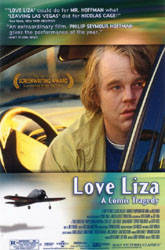 Director: Starring: Release: 20 Dec. 02
|
Morvern Callar BY: DAVID PERRY Morvern Callar (Morton) lives in a comfortable Glasgow apartment with her academic boyfriend. Their relationship seems to be more out of their ability to give things to each other: he gives her respectability, she gives him sex. Neither are terribly dependent on the other, but their presence still seems to have some comforting effect on the both of them. All this can be seen in the opening to Lynne Ramsay's Morvern Callar even though the boyfriend never really appears, nor does Morvern narrate any passage about their life together. Instead, Ramsay tells volumes about the listless existence of her protagonist through images that lure the viewer into the same catatonic lifestyle that Morvern has long accepted for herself. The opening images -- bringing to mind Alain Resnais' opening to Hiroshima, Mon Amour -- show Morvern and her boyfriend sprawled across the floor, the lights of their Christmas tree occasionally illuminating their bodies. She lightly strokes his face as his wrists lay in a pool of blood. It is not clear if she is barring herself from accepting his suicide, but Morvern's form of grief never becomes realistic but always remains oddly in character. The guy is selfish enough to kill himself in the days before Christmas, ask Morvern in a suicide letter to take care of his errands (which include sending his finished manuscript to some London publishers), and cleanup the mess he's left in the floor. Morvern's place in his mind seems to be that of the submissive woman. Regardless of whether she has accepted this in the past -- his remaining with her makes it seem that this is highly likely -- Morvern ceases to allow any form of reservation by withdrawing the money in his bank account, leaving his body on the floor for days (before unceremoniously ridding herself of the walking impediment in the kitchen doorway that was his legs), and changing the name on the manuscript to her own. She seems to be announcing (even if she's the only one hearing this proclamation) that she is not going to let herself fall into the clichés of grief and subordination. Her actions first seem to be too much -- her immature view of freedom has allowed her to weave into anarchy (à la Charles Johnson's "Menagerie: A Child's Fable") but the undercurrent to all her actions comes more from the give-take relationship she in her past. If he is going to leave her with all this physical and emotional baggage, she is going to get something out of it. One begins to imagine that, outside of the place to stay and some nice presents left under the Christmas tree, he had failed to ever return her love and devotion. Morvern Callar is about the moods within this single woman. There's little discernable story other than a glance at the way Morvern acts during her unshackling from the Scottish milieu (this film makes a fantastic companion piece to Trainspotting, both the novel and the film) because this is a story about character dynamics, not contrivance. While there are occasions when story appears -- like Morvern's attempt to share the hedonistic holiday lifestyle of her friend Lanna (McDermott) while in Spain (a trip paid for, of course, by the money meant to go towards the boyfriend's funeral) -- they seem to be background filler for the emotions flowing through Morvern in reaction or, in some cases, passively oblivious to these events. To bring the weight of a silent star (Lillian Gish immediately comes to mind) needed to portray Morvern's deep, sad stare, Ramsay has hired Samantha Morton, a fierce actress who can be terrifying within her seemingly fragile frame. There's much distance between Morvern and the world she seems to be staring at (not unlike the idyllic world that Ramsay's previous protagonist, the lower-class kid of Ratcatcher, kept staring through the window trying to find), and Morton is the reason that this is so perfectly conveyed to the audience. Ramsay and cinematographer Alwin H. Kuchler make these long moments seem like
projected art through their use of light and framing, as well as in the use of music (the
film's final sequence, set to the Mamas and the Papas' "Dedicated to the One I
Love" finds an eerie side to the song that seems unthinkable in relationship to its
otherwise folk pop sound). If Morvern Callar, both the character and the film,
remains an enigma too far out of reach to become worth watching, Ramsay and Morton's have
achieved their intended reaction. Morvern isn't meant to be soft and cuddly, but instead
complex, foolish, engaging, repulsive, and confused at the same time. She is grieving, the
only way she knows how. |
|
| ©2003, David Perry, Cinema-Scene.com, 28 March 2003 | ||



